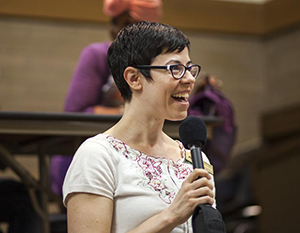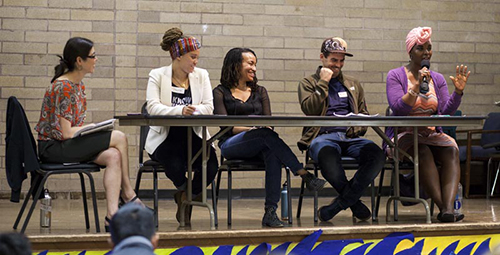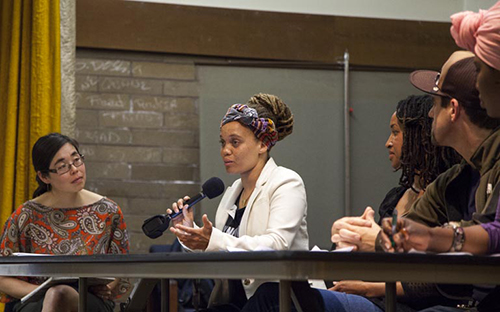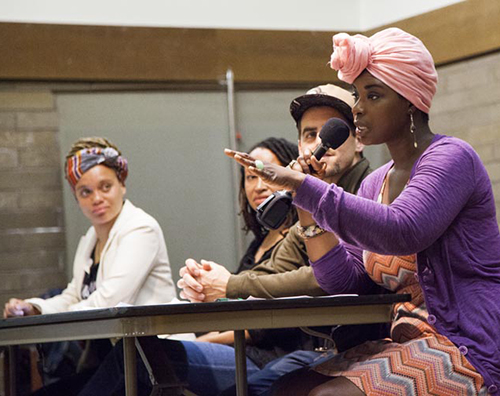Talking with Kids about Race and Racism at Oakland Public Library
 Since late 2014, when protests in Ferguson, MO, brought national attention to #BlackLivesMatter and the racial justice movement, many people—myself included—have been struggling to find age-appropriate ways to talk with youth about race, racism and current events. I had an eye out for local resources on the topic, and saw several listings throughout 2015 for workshops in the Bay Area on how to initiate conversations about race with kids, but they were either expensive to attend or at full capacity by the time I tried to register. Community interest in these events was clearly strong! It made me wonder: couldn't the library host a program—possibly a panel discussion—on the topic of talking with kids about race and racism?
Since late 2014, when protests in Ferguson, MO, brought national attention to #BlackLivesMatter and the racial justice movement, many people—myself included—have been struggling to find age-appropriate ways to talk with youth about race, racism and current events. I had an eye out for local resources on the topic, and saw several listings throughout 2015 for workshops in the Bay Area on how to initiate conversations about race with kids, but they were either expensive to attend or at full capacity by the time I tried to register. Community interest in these events was clearly strong! It made me wonder: couldn't the library host a program—possibly a panel discussion—on the topic of talking with kids about race and racism?
Oakland Public Library's administration agreed that such an educational program would be responsive and relevant for us to offer to the community, so I moved forward on planning the event. The Youth and Families committee of Showing Up for Racial Justice (SURJ) – Bay Area was eager to co-sponsor the program. This is just one local chapter of a quickly growing national organization; check out their website to find an active chapter near you. I worked in close collaboration with their committee chair, Anna Blackshaw, to pull together a multiracial panel of local parents, caregivers and educators who could share their thoughts, experiences and best practices relating to how adults can effectively talk about race and racism with children.
Anna and I cast a wide net when contacting potential panelists. We tapped one mutual acquaintance who we knew would make an excellent speaker on the topic, reached out to local organizations in the social justice and youth education realms to find more panelists and asked colleagues for their suggestions on—and introductions to—others we could invite to participate. It was a stretch at first for me to initiate (and, when I didn’t hear back within a week, follow up on) communications with organizations and individuals who I didn't already know, but I soon realized that people were eager to be a part of the conversation, especially because it was being hosted at the public library.
 We spent more than two months curating and finalizing the panel—and our careful selection process resulted in this 90-minute discussion* packed with thoughtful analysis, inspiring ideas and practical advice. Lindsay Imai Hong facilitated the panel, which included Shayna Cureton from Abundant Beginnings, Marilyn Hollinquest from the Radical Monarchs, artist and activist Ariel Luckey, and Malaika Parker from PACT, an Adoption Alliance. A film crew working on a documentary about the Radical Monarchs took video of the event, and they delivered a clean audio recording of the discussion to us as a courtesy for welcoming them into the library.
We spent more than two months curating and finalizing the panel—and our careful selection process resulted in this 90-minute discussion* packed with thoughtful analysis, inspiring ideas and practical advice. Lindsay Imai Hong facilitated the panel, which included Shayna Cureton from Abundant Beginnings, Marilyn Hollinquest from the Radical Monarchs, artist and activist Ariel Luckey, and Malaika Parker from PACT, an Adoption Alliance. A film crew working on a documentary about the Radical Monarchs took video of the event, and they delivered a clean audio recording of the discussion to us as a courtesy for welcoming them into the library.
Like all library programs, this discussion was free and open to the public. Given the enthusiastic responses we had received from everyone we told about the event, I was nervous that we'd have too large a crowd to fit into the library space. So I created an RSVP-only listing on Eventbrite and floated it out on the Oakland Public Library and SURJ-Bay Area Facebook pages. We had 175 RSVPs and a wait list within a couple of weeks, but capacity for only about 130 attendees, so we didn't put extra effort into promoting the program. The library listed it in our online and print calendars, SURJ-Bay Area featured it in their weekly newsletters, one copy of a flyer was posted in each library location and a press release went out a few days before the event.
 The Eventbrite listing was useful in that it allowed us to communicate directly with attendees about what they wanted to learn from the panelists, and efficiently post information and field questions before the event. We offered childcare and race-conscious children's programming at the event (thanks to Abundant Beginnings with support from SURJ-Bay Area volunteers), and emailing attendees through Eventbrite helped us pre-register kids for childcare.
The Eventbrite listing was useful in that it allowed us to communicate directly with attendees about what they wanted to learn from the panelists, and efficiently post information and field questions before the event. We offered childcare and race-conscious children's programming at the event (thanks to Abundant Beginnings with support from SURJ-Bay Area volunteers), and emailing attendees through Eventbrite helped us pre-register kids for childcare.
When it came time for the program, however, a little less than half of those who RSVP'd actually attended. In the future, for an event like this, I won’t set a cap on the RSVPs, and I won't spend time maintaining a wait list. Instead, I'll encourage people to arrive early for good seats and make sure we have a strong PA system in case we end up with a standing room only situation.
Money-wise, the only program expenses were for childcare and chair rentals; our Friends of the Library covered those costs. The panelists all generously volunteered their participation.
On the evening of the program, we set up a resource table for flyers and information relevant to the topic at hand and to the organizations represented on the panel. A colleague put together a beautiful display of library materials for attendees to browse, highlighting titles that feature kids of color, family diversity and stories of freedom fighters, as well as books for young children that talk explicitly about race.
 Volunteers from SURJ-Bay Area greeted and signed in people as they came through the doors. The kids had an amazing experience in the children's area with Abundant Beginnings. Eighty adult attendees were privy to a powerful community conversation about how we can effectively talk about race and racism with young people. And I learned that, as a branch children's librarian, my program-planning capacity is much greater than I had previously imagined!
Volunteers from SURJ-Bay Area greeted and signed in people as they came through the doors. The kids had an amazing experience in the children's area with Abundant Beginnings. Eighty adult attendees were privy to a powerful community conversation about how we can effectively talk about race and racism with young people. And I learned that, as a branch children's librarian, my program-planning capacity is much greater than I had previously imagined!
Since this program, I've had lots of patrons and colleagues reach out to me seeking more information to support them in talking with kids about race and racism. The following are all excellent resources:
- Resources for Talking about Race, Racism and Racialized Violence with Kids from Border Crossers.
- Talking to Kids About Racism and Justice: a list for parents, caregivers & educators, part of the #BlackLivesMatter Resource Series from Oakland Public Library.
- Raising Race Conscious Children offers insightful blog posts and small group webinars where participants learn to and practice techniques for effectively talking about race with young children. A few months back, I organized a group of local children's librarians for one of their webinars; a racial literacy study group of youth services librarians has emerged from that first meeting.
- EmbraceRace sends out bi-monthly newsletters and recently hosted a webinar on Supporting Children of Color in the Wake of Racialized Violence.
* Editor's Note: The recording is an extremely valuable resource both for the content of the discussion and as a template for creating a panel at your own library. Listen to the recording together with your colleagues, explore the resources, and discuss what resonates and how your library can be a part of supporting kids as they explore these complicated and personal topics themselves.
Photos: All photos by Rivkah Beth Medow.
From top: the author Miriam Medow, Children's Librarian, Oakland Public Library, Dimond Branch.
The full panel, from left to right, Lindsay Imai Hong, Shayna Cureton, Malaika Parker, Ariel Luckey, and Marilyn Hollinquest.
Shayna Cureton from Abundant Beginnings speaks at the panel on May 10, 2016.
Marilyn Hollinquest from the Radical Monarchs shares during the panel event.
